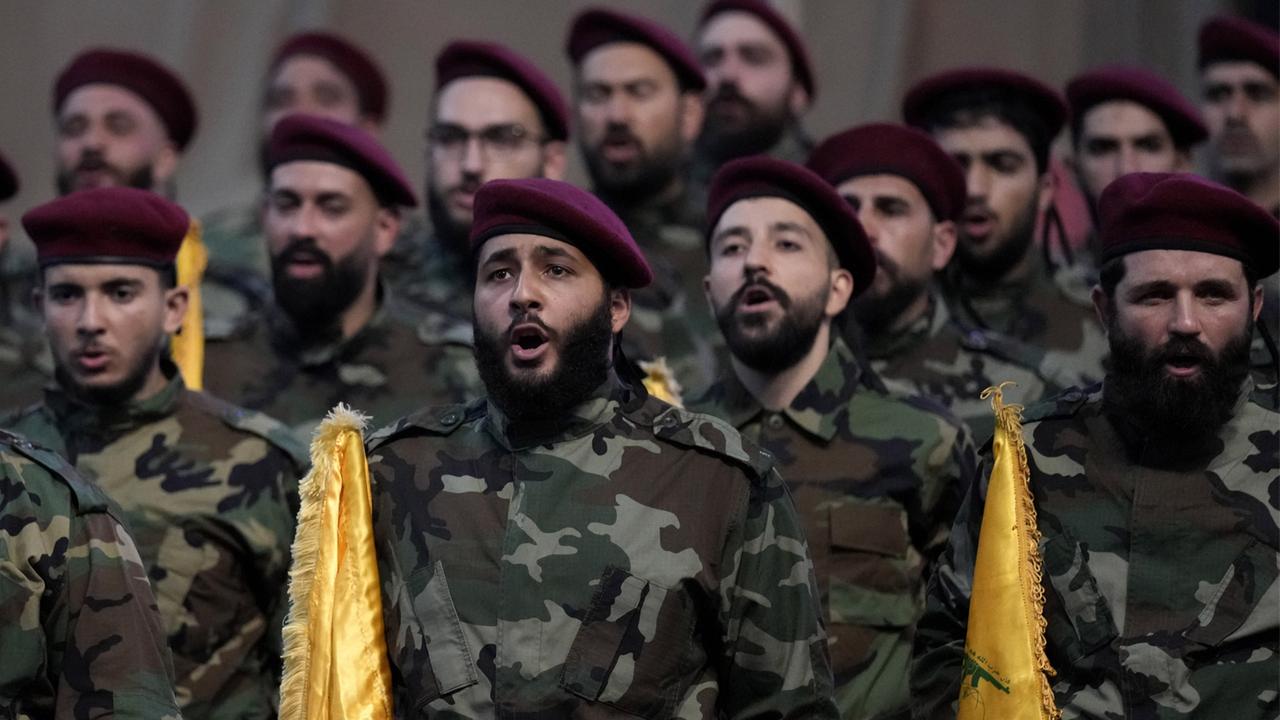report
Ali is a Hezbollah fighter. The father of a family is waiting in Beirut to go to war against Israel. What drives him and the Shiite militia? A meeting in the capital of Lebanon.
Ali is waiting for the war. He smokes and stares into space. He has a long black beard, an olive green baseball cap, the sleeves of his black shirt rolled up – underneath is the tattoo on his forearm: a large curved sword with two blades, surrounded by Arabic writing. The sword of Imam Ali, he says. The first imam and saint of the Shiites.
Ali is a Hezbollah fighter. He went to war for the Shiite militia in Syria and learned how to handle weapons. Now the 40-year-old family man lives in the south of Beirut, in one of the poor neighborhoods controlled by Hezbollah, and waits to see what happens. For him to be needed, as he says.
Hezbollah fighter Ali claims he wants peace. Nevertheless, he is ready for war.
Trying to understand
We meet in one of those Beirut street cafes, where the faux brick wallpaper is slowly rolling off the wall and the plastic flowers on the wobbly table in the neon light try to maintain the illusion of coziness. This is where Ali, as he calls himself, sits.
“We don't want war. We want peace,” Ali claims. “But if the enemy wants war, we are ready. The rest of the world doesn't like us, says we are terrorists.”
“Everyone is afraid of death”
Is it right to meet with someone who is considered a terrorist by much of the Western world? Yes, perhaps, if it is to try to understand how Hezbollah thinks, why its followers want to go to this war that they often refer to as “holy.” How hateful those are who actually say they want peace. So is Ali.
He is the father of three small children. His son is only two years old. And the father says things like: “Now I can die because I have a son.” As a martyr. Does he want to die in a war? “Everyone is afraid of death,” he says.
A state within a state has emerged in Lebanon
Hezbollah has extensive power in Lebanon – a state within a state has emerged that is currently holding an entire country hostage.
“For me, Hezbollah is a terrorist organization that has taken over the state of Lebanon,” says Monika Borgmann. The German has lived in Lebanon for years and was married to the well-known filmmaker Lokman Slim, who was murdered in 2021, according to all evidence by Hezbollah.
Since then, Borgmann has not stopped warning: “Hezbollah is in charge here. Hezbollah decides on war and peace. Hezbollah made the unilateral decision to drag Lebanon into the war after the Hamas massacre on October 7. Everyone is afraid today.”
Well-equipped militarily thanks to Iran
The militia was founded more than 40 years ago. At the time, it saw itself as a Shiite counter-movement to the strong Christian Maronite, Sunni and Druze powers in the country during the long civil war. Since then, the Shiite Hezbollah has grown dramatically in strength – both its political and military arms.
Hezbollah has an extensive social system that provides for its followers – and is well equipped militarily, especially thanks to its closest ally and sponsor: Iran. It has supplied Hezbollah with weapons, armed it and is considered the puppet master behind Hezbollah's decisions.
Hezbollah is the most important part of Iran's so-called axis of resistance against Israel, which also includes Shiite militias in Iraq and Syria, as well as the Houthis in Yemen and Hamas.
Many Lebanese do not want war
“Hezbollah's significance goes far beyond Lebanon, Syria, Iraq, Yemen,” says political scientist Yeghia Tashjian of the American University of Beirut. “An organization parallel to the state that has to balance between a military part and a real-political part that does not want to lose the support of the population. The current situation is like a volcano that is bubbling and we do not know when it will explode.”
Since Hezbollah commander Fuad Shukr and Hamas leader Haniya were killed at the end of July, Israel has been expecting a massive retaliatory strike from Hezbollah and Iran. There are daily major and minor skirmishes in the border area, as well as drone and rocket attacks on both sides.
The fighter doesn’t want to hear any criticism
No one knows when it will get worse, when and if this war, which many in Lebanon do not want, will get bigger. But Hezbollah is simply too influential, says Lebanese journalist Assaad Bechara. Like many of his colleagues, he fears for his freedom as a reporter because Hezbollah spreads a climate of fear.
“For many in the country, Hezbollah is an agent of Iran, a disease in the Lebanese body. Hezbollah is destroying the possibility of making Lebanon a functioning state,” says Bechara.
Ali, the Hezbollah fighter, doesn't want to hear any criticism. When asked how he feels about the impending escalation, the war that could spread in Lebanon, he says just three words – he speaks quietly and slowly, choosing them carefully: “Sad, happy, nervous.”
Lebanon's capital Beirut: Hezbollah has great influence here.
The absurdity of war
Sad because children are dying in Gaza, happy because Hezbollah is offering resistance, nervous because he doesn't know what's coming, how big it will be.
It is the absurdity of war that those who shoot claim to be for peace. When asked why he is not fighting in the south yet, Ali shrugs his shoulders. There is not a real war yet, he says, there are enough fighters down there. But if it really starts, he is ready.





